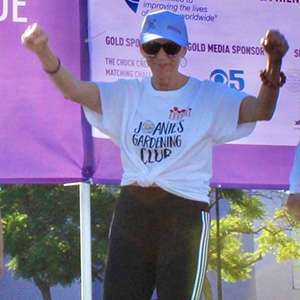
Editor’s note: Caregiver Scott Kriens recently wrote about his wife Joanie’s pancreatic cancer diagnosis and treatment, including clinical trials. We are publishing an excerpt of the story – you can read the full piece here.
Scott says: “We share our story with great hope that it may ease the journey for others, should cancer cross your path.”
In the summer of 2017, my wife Joanie had a routine blood test that revealed a suspiciously elevated biomarker, CA-125, typically indicative of the possibility of cancer in the pelvic area. Our first response was that this must certainly be a mistake and a retest would confirm that. After all, Joanie was perfectly healthy with no discomfort or cause for concern.
However, the second test only confirmed the first, leading to an ultrasound that revealed what was, we thought, the worst possible news – there was evidence of a mass, more than one, strongly suggesting cancer was indeed present in Joanie’s ovaries.

Scott and Joanie Kriens, winter 2021
After facing the reality of the prognosis we made a decision. Joanie was 57, had no need for ovaries, uterus, fallopian tubes, or anything else that could be removed to prevent the spread of disease.
A radical hysterectomy followed, after which came a deep sigh of relief. We weren’t completely out of the woods, as there was still a need for chemotherapy to be sure the disease would be put to rest. A port was placed in her body, with the expectation that regular access for intravenous delivery of chemotherapy would be required for six-plus months.
All of this was made bearable by the knowledge that the surgery was behind us, it was successful, and however difficult the chemo would be, it was all part of the recovery and subsequent return to normal life for the next several decades.
Except that is not what happened.
Upon returning to see the surgeon three weeks after the hysterectomy to have a review of the procedure and confirm our progress, we found out something very different. The biopsied tissue was tested in routine pathology following surgery, and the findings were ominous. The tumor tissue was indicative of a different point of origin for the cancer.
At this point, we were sent to a different doctor, to discover a different and potentially much more lethal disease – pancreatic cancer.
After walking numbly across the hospital campus in a fog of disbelief, we found ourselves in the parking lot, unable to start the car, unable to even comprehend what had just happened. We expected to be well on the way to cure of a stage III ovarian cancer, and instead were told we were in a fight with a stage IV pancreatic cancer diagnosis.
We put the best face on it we could, told the kids what we knew, tried our best not to speculate, and went in search of help.
We found PanCAN, an excellent organization dedicated to helping patients by fighting pancreatic cancer in a comprehensive way.
We contacted Stanford and found a trial for Joanie. For the next year, the results were positive. There were tumors in the pancreas, the liver, and the lungs, all of which responded to treatment and shrunk by 60 to 80%.
Along with these results, CA 19-9, a measurable biomarker that can signal cancer growth, was falling from a high of 17,000 to less than 100, where normal was anything less than 35. This was indeed encouraging, until progress stalled and the masses remained at their reduced levels. Then CA 19-9 began to climb, an indication that the tumor was active and growing.
Something else would be needed. The treatment was no longer working.
Fortunately, at the onset of treatment, tissue from the tumors found in the ovaries was sequenced to see the precise genetic makeup of the tumor mass. We had the individual signature from the biology of Joanie’s disease.
We cannot stress enough the importance of this step -- biomarker testing -- when faced with a cancer diagnosis of any type.
The findings from the biomarker testing led us to another trial, called TAPUR, which explored if existing drugs originally designed for one type of cancer could be treatment options for other cancers.
By this point in our journey, we came to an important realization. This disease and its prognosis were not a given. Sadly, there are many fatal stories out there, but not all of them are. Ours did not have to be a fatal story.
It became clear to us that attitude and belief matter. It matters for the outlook of the patient, and it matters in the approach and commitment of the team surrounding that patient. Along with the latest advances in cancer science and therapies, gratitude and resilience were an important and absolutely necessary part of the treatment and outcome.
Armed with Joanie’s positive outlook and the results of biomarker testing, we embarked on a search for the latest treatment options, some conventionally available, others not. Over the next year, we used aggressive radiation, a novel immunotherapy and a personalized cancer vaccine to mount a three-pronged strategy against the progress of the tumors.

Joanie Kriens at PanCAN PurpleStride
Today, gratefully, Joanie has no evidence of disease and has had clear scans for more than 18 months. We have learned many things. We know that it is possible, at least in the one case described here, to reduce a potentially terminal cancer to a chronic condition that can be managed.
We also know that it is dangerous to casually declare a cure. We are grateful to have found so many dedicated and committed caregivers for all the treatments we have been fortunate to receive. A simple “thank you” hardly say enough. These people are truly heroes.
Below are the 10 most important things we have learned throughout our journey:
- You must be your own advocate. Take responsibility for your own care.
- Attitude and gratitude matter. A lot. That doesn’t mean pretend or deny the seriousness of your disease. There will be dark moments. Keep going. You and those you love are worth it.
- Ask for help and support, whether you are a patient or a caregiver. You will need it.
- Get biomarker testing – through your healthcare institution or PanCAN’s Know Your Tumor® precision medicine service!
- Never wait for the next appointment to get test results. This is a time of uncertainty and stress that does not have to be. Insist on results as soon as they become available, and make sure that they are posted to your medical file for your review.
- Search for organizations dedicated to your cancer type. Nonprofit organizations can help a lot here. You are closer than you think to finding what you need, whether it be a trial, a doctor, an institution, or a drug. Keep asking until you find it.
- Remember that the statistics you find are backward looking, representing the past and the averages in the fight against your cancer, NOT the future. And discoveries are happening quickly.
- The medical industry operates in many disconnected ways. This is not the fault of any individual participant. Drug companies are trying to find drugs that work. They have to focus on that as their priority is to find safe drugs. Hospitals must be busy to be affordable. They are full of doctors and nurses who care deeply, or they would have never gone through the work to attain their professional ranks.
- All of this means that you have to take ownership of your treatment and disease. You must find caregivers with the energy and belief to match your own.
- You will need a quarterback and a team that you trust, a team that may save your life. Interview doctors and research institutions. Find people you believe in. Keep looking until you find them. In the words of one of our favorite doctors, Sunil R. Hingorani, MD, PhD – “if you find yourself being told there is nothing else that can be done against your cancer, get up and go find another doctor.”
Additional Resources
- Cancer Commons: An organization focused on helping you get 1-on-1 support to find the best treatment for your advanced cancer.
- Canopy Cancer Collective: A nonprofit initiative started by the 1440 Foundation with the goal of faster sharing and better learning between 14 pancreatic cancer centers in the U.S., leading to better outcomes for the patient.
Any treatments, including clinical trials, mentioned in this story may not be appropriate or available for all patients. Doctors take many things into account when prescribing treatments including the stage and type of cancer and the overall health of the patient.





